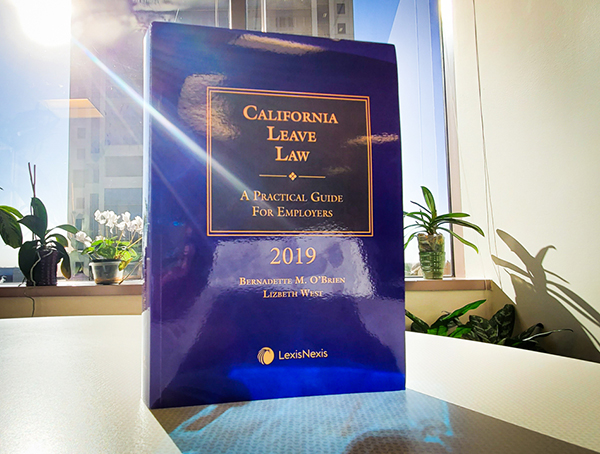COVID-19: Resources for California Employers (Updated 4/3/20)
Published: March 24, 2020
The COVID-19 pandemic is forcing employers to make unprecedented decisions about their workplace. In an effort to help employers as they make the difficult decisions they are currently facing, we have gathered guidance released by many of the federal and state agencies specifically related to COVID-19. We hope this page is useful resource. That being said, this is a rapidly changing area of law, and new guidance is being implemented on what seems like a daily basis. As such, we recommend employers consult with counsel for the latest developments, including prior to taking any actions.
State of California and City/County Orders:
As we have previously told you here and here, both the State of California and many cities and counties throughout the state have issued shelter-in-place orders. While the city and county orders may not loosen the State’s Order, they may be more restrictive. While not an exhaustive list, you can find many of those Orders and Directives below:
- State of California (essential occupations defined here)
- Alameda County
- Colusa County
- Contra Costa County
- El Dorado County
- City of Fresno
- Humboldt County
- Los Angeles County
- Marin County
- Mendocino County
- Merced County
- Napa County
- Orange County
- Placer County
- Plumas County
- Riverside County
- Sacramento County
- San Bernardino County
- San Diego County
- San Francisco County
- San Juaquin County
- San Luis Obispo County
- San Mateo County
- Santa Barbara County
- Santa Clara County
- Santa Cruz County
- Solano County
- Sutter County
- Tehama County
- Ventura County
- Yolo County
- Yuba County
Department of Labor:
On March 18, 2020, Congress passed the Families First Coronavirus Response Act (“FFCRA”). The President quickly signed it into law on the same day. The Act provides paid sick time and expands the Family and Medical Leave Act to provide an extended period of unpaid or partially paid leave for qualifying reasons related to the COVID-19 public health emergency. Our previous blog post summarizing the FFCRA can be found here.
The DOL has issued a FAQ for the FFCRA. This Q&A page answers common questions to the Act (including which employers are subject to the FFCRA and calculating pay for purposes of complying with the FFCRA, such as computing hours for part-time employees and including overtime for full-time employees), and specifies that it applies to leave taken between April 1, 2020 and December 31, 2020. Please see here, here, here and here for blog posts discussing the guidance. The DOL has also released a webinar providing information regarding the FFCRA for both employers and employees, which can be accessed here. Accompanying Power Point slides can be accessed here.
On March 25, 2020, the DOL released the Notice to employees regarding the FFCRA. Employers will be required to post this notice wherever it posts its other required notices, as well as distribute it to its remote employees. The Notice can be found here and a FAQ related to the Notice here. A blog post discussing this Notice can be found here.
On April 1, 2020, the DOL announced the issuance of its Temporary Rules regarding implementation of the FFCRA and what employers who are subject to it must do to ensure compliance. The Rules can be found here. A blog post discussing the Temporary Rules can be found here.
Coronavirus Aid, Relief, and Economic Safety (CARES) Act:
On March 27, 2020, the Coronavirus Aid, Relief, and Economic Safety (CARES) Act was signed into law. Among other things, the CARES Act significantly expands unemployment benefits, offers loan support to small businesses, and provides for refundable payroll tax credits. Our blog post discussing the CARES Act can be found here.
Centers for Disease Control and Prevention (CDC):
The CDC has issued the following guidance for businesses responding to the COVID-19 pandemic here. The CDC website contains a wealth of information pertaining to the disease, its symptoms, and other similar information which can be found here. Guidance on when a person with COVID-19 may discontinue home isolation and return to work can be found here.
California Labor Commissioner:
Employees may be eligible to use paid sick leave under state and local law. California’s Labor Commissioner has issued an FAQ on California’s paid sick leave law during the COVID-19 pandemic.
California WARN Act:
On March 17, 2020, Governor Gavin Newsom issued an Executive Order suspending the 60-day notice requirement of Cal-WARN for employers who meet certain requirements. Specifically, in order to be relieved of the Cal-WARN notice requirements, employers considering mass layoffs must give the required notices with as much notice as practical, and for all written notices after March 17, 2020 California employers must also include the following statement (in addition to the other required language): “If you have lost your job or been laid off temporarily, you may be eligible for Unemployment Insurance (UI). More information on UI and other resources available for workers is available at labor.ca.gov/coronavirus2019.” More information regarding the Executive Order N-31-20 can be found here.
Department of Fair Employment and Housing (DFEH):
The DFEH issued an FAQ related to COVID-19. In it, the DFEH encourages California employers to follow the CDC guidelines, and follows many of the EEOC’s guidelines for dealing with the COVID-19 pandemic. This includes permitting employers to ask employees with COVID-19 to leave work, permitting employers to ask employees if they are experiencing symptoms of COVID-19, and conducting temperature checks for the purpose of evaluating the risk a particular employee may present to the workplace. It further reminds employers that all health information must be kept confidential, and provides guidance for employers as to evaluating requests for leave under the California Family Rights Act (CFRA) and as a reasonable accommodation.
Department of Homeland Security (DHS):
The Department of Homeland Security (DHS) has announced that, in light of the shift to a remoted workplace, it provide some flexibility with respect to Employment Verification (Form I-9) regulations. In doing so the DHS is permitting employers to inspect Section 2 documents remotely, as well as to retain copies of those documents. The announcement can be found here.
Department of Treasury (DOT), Internal Revenue Service (IRS), and Department of Labor (DOL):
On March 20, 2020, the Department of Treasury, IRS, and Department of Labor announced plans to provide some relief for small and midsize employers in light of the recently passed Families First Coronavirus Response Act. Specifically, it was announced that employers will have access to refundable payroll tax credits designed to provide reimbursement for the cost of providing COVID-19 related leave to their employees. The full announcement can be found here.
On March 31, 2020, the IRS issued 66 FAQs providing guidance to employers in connection with the payment of, and tax credits for, emergency paid sick leave (E-PSL) and emergency FMLA leave (E-FMLA) under the Families First Coronavirus Response Act (“FFCRA”). Our blog post discussing those FAQ’s can be found here.
Employment Development Department (EDD):
The California Employment Development Department has released FAQ’s designed to help employers and employees determine what benefits and programs might be available as a result to job loss related to COVID-19.
The Equal Employment Opportunity Commission (EEOC):
The EEOC issued updated its guidance to help aid employers determine what actions may be taken during the pandemic, without violating the Americans with Disabilities Act (ADA) or the Rehabilitation Act, considering the COVID-19 epidemic. This guidance makes clear that the ADA and Rehabilitation Act do not interfere with or prevent employers from following the guidance of the CDC or other public health authorities. That guidance can be found here.
Federal Motor Carrier Safety Administration (FMCSA):
On March 18, 2020, the U.S. Department of Transportation’s Federal Motor Carrier and Safety Administration issued an emergency declaration, which broadened federal exemptions from compliance with certain driver safety regulations for interstate commerce, including the federal Hours of Service regulations. Information regarding this emergency declaration can be found here.
U.S. Department of Health and Human Services (HHS):
On March 28, 2020, the Office for Civil Rights of the HHS released a bulletin reminding employers of their obligations despite the pandemic. This followed their earlier bulletin confirming that HIPAA still applies despite the pandemic.
Occupational Safety and Health Administration (OSHA):
Employers have an obligation under the Occupational Safety and Health Administration (“OSHA”) to keep its workplace free from a hazard where: (1) the hazard is recognized; (2) the hazard was likely to cause death or serious physical harm; and (3) the hazard could feasibly be corrected. (See 29 U.S.C. § 654(a)(1).) This applies to COVID-19 in the workplace. Similarly, the California Occupational Health and Safety Administration (“Cal/OSHA”) protects employees from working conditions that could pose an imminent danger to employees. OSHA has instructed employees to follow the U.S. Centers for Disease Control and Prevention (“CDC”) interim guidance with respect to responding to the threat of COVID-19. That guidance can be found here. Cal/OSHA has published its own set of guidelines, which can be found here.
U.S. State Department:
The Department of State has issued a “Level 4” travel advisory, advising all American citizens to refrain from international traveling due to the COVID-19 outbreak. That advisory can be found here.
Office of Federal Contract Compliance (“OFCCP”):
The OFCCP has granted a three-month, national interest exemption and waiver from AAP obligations for new federal contracts “entered into specifically to provide Coronavirus relief.” This “exemption and waiver extends to all affirmative action obligations of supply and service and construction contracts, and other obligations as specified in” FAR clauses 52.222-26 (EEO-Executive Order 11246); 52.222.35 (veterans); and, 52.222-36 (individuals with disabilities). More information about this waiver can be found here.
San Francisco, Office of Labor Standards Enforcement (OLSE):
On March 24, 2020, the San Francisco Office of Labor Standards Enforcement issued guidance regarding use of COVID-19-related paid sick leave as used by San Francisco employees. That guidance can be found here, and a blog post discussing the OLSE guidance can be found here.
The attorneys at Weintraub Tobin are available to assist you as you evaluate the difficult decisions that employers throughout the state are being faced with. Please reach out to the Weintraub Tobin attorney you regularly work with, or to any of the attorneys in the Labor and Employment Group.




